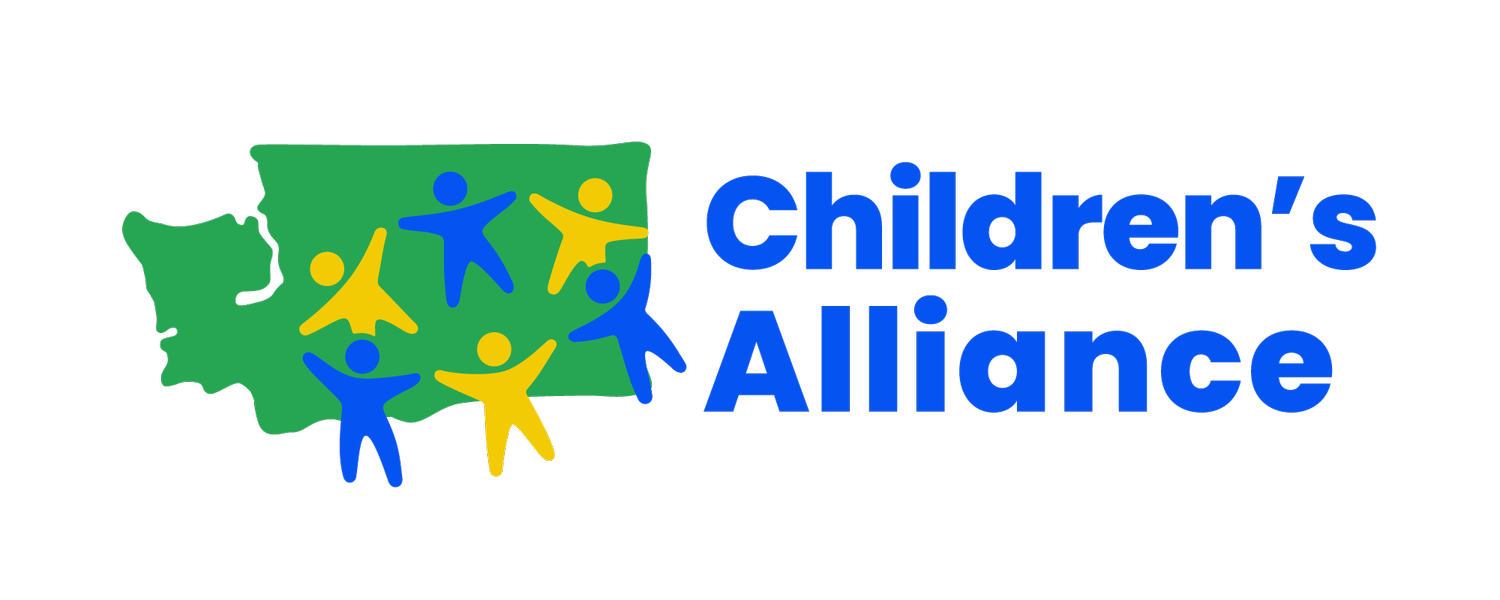2025 LEGISLATIVE AGENDA
The Building Blocks of Our Agenda
At Children’s Alliance, we see a future in which all of Washington's children have an abundance of what they need to grow up to be the people they dream of becoming. To make this vision a reality and combat harms created by systemic racism, we work with those most negatively impacted by current laws to ensure that our state prioritizes progressive policy changes in the areas of early learning and child care, health equity, and economic justice.
Our state is facing a staggering budget shortfall over the next four years. As a result, we are focused on protecting against cuts to key programs, fiercely advocating for progressive revenue solutions that compel corporations and the ultra-wealthy to pay their fair share, and fighting against any efforts to balance the budget on the backs of those who are furthest from opportunity.
Here are our top priorities for the 2025 legislative session:
Early Learning
-
The Fair Start for Kids Act (FSKA) includes a commitment that all eligible, interested children will be entitled to a slot within the Early Childhood Education and Assistance Program (ECEAP). Honoring this commitment requires more facility space, additional slots across the state, and increased compensation for providers. Responding to current needs in the field, we are advocating
for a compensation rate increase for providers this year, as well as an increase of slots until every eligible child has a guaranteed spot. This advocacy responds to current needs in the field by delaying full implementation of the entitlement while still prioritizing the addition of new slots to and ultimately reach the entitlement goal. -
Washington families are generally eligible for child care subsidies if their incomes are at or below 60% of the state median income (SMI) or 65% for currently enrolled families. In line with FSKA requirements, we are advocating for adjusting the cutoff to 75% of SMI to increase the number of families that are eligible. It is also important for the WCCC program to pay providers a rate that is competitive to the amount that families pay without subsidies. FSKA requires child care subsidy rates for licensed child care centers to achieve the 85th percentile of market rates in the state, so we are advocating to ensure that provider subsidy rates are set at the 85th percentile based on the 2024 market rate.
-
Safe infrastructure is essential for early learning programs, and this proposal would invest $50M in the Early Learning Facilities (ELF) fund to help WCCC and ECEAP providers pay for facilities and eligible renovations so that they can best serve their communities.
Health Equity
-
Limit the harmful effects of social media on kids' behavioral health by enhancing data privacy and content delivery restrictions, prohibiting platforms from pushing content to kids during school and sleep hours, and equipping families with the tools necessary to ensure a healthy relationship with digital media.
-
Washington currently lacks a common platform through which children and youth can learn about, be screened for, and access behavioral health interventions. Creating a single point of access for the variety of behavioral health needs and resources will greatly expand access to mental and behavioral health care for youth.
-
Lack of coordination between multiple state agencies is part of the reason Washington is ranked 48th out of 50 states in the behavioral health care it provides to children. We are advocating for the creation of a new state-led entity to coordinate programs and delivery of mental and behavioral health intervention across the state.
-
We have heard from parents, educators, academics, and health providers about increasing gaps in academic and behavioral outcomes for boys and young men in Washington. As a result, we are advocating for the creation of a state commission, modeled on the existing Washington State Women’s Commission, to hear from key stakeholders and make recommendations to the Legislature to confront these alarming trends.
Economic Justice
-
Many crucial state programs and services rely on state revenues, and we must ensure that those most in need of these services are not also the only ones bearing the tax burden to fund them. We are advocating for a 1% tax on extreme wealth resulting from ownership of financial property like stocks and bonds.
Children’s Alliance also supports the following progressive proposals:
Allow eligible children to access available ECEAP slots when they turn three (HB 1350)
Make the Early Learning Facilities Fund more accessible (HB 1314/ SB5297)
Recognize the Cost of Quality Care for early learning (HB 1350/ SB 5500)
Re-link ESIT (Early Support for Infants and Toddlers) funding to preschool special education
Fully fund home visiting rates
Improve equity in funding for rural communities
Provide universal free school meals (SB 5352/ HB 1404)
Increase dedicated funding and programming for Indigenous communities, including by allocating funding to the Tribal Early Learning Fund
Adopt 2025 recommendations from Children and Youth Behavioral Health Work Group
Implement a Guaranteed Basic Income (GBI) program
Enact the Affordable Homes Act/real estate excise tax reform
Enact a high earners payroll taxon employers
